Reviews
Bruce Campbell vs. Army of Darkness / Evil Dead 3: The Medieval Dead / The Ultimate Experience in Medieval Horror
Sam Raimi
USA, 1992
Credits
Review by Chiranjit Goswami
Posted on 29 October 2007
Source Anchor Bay Entertainment DVD
Categories 31 Days of Horror
During high school, my friends and I must have spent countless hours of our adolescence shooting various sketches that we scripted for creative projects that were assigned for our mandatory French courses. These videos, which probably resembled the material offered during the final ten minutes of SNL if it were dubbed in broken 7th Grade-level French, were extraordinarily amateurish and while they never entered the realm of fantasy, the scenarios certainly deviated from reality. Such nonsensical digressions were sometimes due to our limited resources - a gigantic six foot-tall Yogi Bear doll was our most dependable stuntman - but were more likely due to our personal creative obsessions, perpetually hysterical imaginations, and a juvenile compulsion to test the boundaries imposed by authority figures by smuggling in as much lurid material as possible. Without any real knowledge of filmmaking theory besides the excess of mainstream movies that a couple of us had watched intently, our comedies were, in retrospect, surprising cognizant of their artifice, including numerous attempts to break the 4th wall and frequent admissions of the fictional circumstances. The end product was usually a peculiar amalgamation of our individual sources of inspiration, somehow blending martial arts, asinine comedy, gangster rap, Monty Python, pulpy crime plots, random violence, pointless French profanity, and an indispensable amount of cross-dressing. I could try to claim that we were attempting to be post-modern, except for the fact that, at the time, we had no idea what the hell that term meant.
Part of the satisfaction of creating these sketches was watching the reactions of classmates and teachers. However, since much of the self-indulgent material puzzled our audience, especially since our methods were sloppy and our French was terrible, I’m certain that our main intent, most of the time, was simply to amuse ourselves. It’s difficult to make a definitive declaration, but I believe the pinnacle of our creative efforts was an elaborate ensemble-piece situated in a restaurant that somehow managed to incorporate a bartender serving alcohol to a toddler, transvestite prostitution, and a surreal Hulk-like transformation of a skinny Caucasian kid into a brawny Chinese athlete in the middle of a knife-fight.
I mention these absurd endeavours because I’ve always felt that Sam Raimi’s early feature films have been able to capture and convey the same youthful spirit that I hope my friends and I exhibited while toiling away at one of the few instances of enjoyable schoolwork. Raimi’s vigorous methods have always produced a uniquely dynamic style that exudes an effervescent energy, but his earliest films appear fuelled by undiluted creative instincts, displaying a distinctive willingness to act on any artistic impulse. Within these films resides a specific brand of illogical imagination and impressive resourcefulness characteristic of fresh filmmaking talents who are unburdened by expectations and thus allow their unique interests to be unleashed onto celluloid. Regrettably, Army of Darkness appears to be last project in which Raimi was allowed such creative autonomy, having now become thoroughly entrenched within the Hollywood blockbuster system and apparently content to operate within its artistic restrictions.
The rousing third instalment in Raimi’s Evil Dead series, Army of Darkness dramatically diverges from the previous two films, abandoning the splatstick comedy and the claustrophobic cabin fever in favour of an extensive action adventure backdrop, but still finds the time to incorporate a comic-book atmosphere, loads of stop-motion animation, Three Stooges-inspired antics, old-school special-effects, and references to everything from Gulliver’s Travels to The Day the Earth Stood Still. Before he made his living by regaling us with lounge-singer renditions of Duran Duran songs in oversexed Old Spice deodorant ads and cashed in on cameos as snotty subordinate characters in Spider-man movies, Bruce Campbell gained his cult following by serving as Sam Raimi’s star within the Evil Dead series, playing the nitwit, reluctant hero, Ash.
Army of Darkness finds Ash working as a house-wares clerk at a large department store named S-Mart, before being magically transported to the 12th century after an unwise visit to a memorable cabin results in unexpected consequence after someone opens an ancient Samarian test called the Necronomicon ex mortis—the Book of the Dead. Ash then drops from the sky into 1300 AD, conveniently accompanied by a myriad of modern tools, including his car, his 12-guage shotgun, his trunk full of science text books, and the chainsaw attached to his arm, only to find himself in the midst of a clash between opposing medieval armies.
After a case of mistaken identity, Ash survives a gladiatorial confrontation with a couple of ghouls and escapes an execution pit, before imposing his modern might upon the “primitive screwheads” that have captured him. Without any ability to traverse through time to get back home to the 20th Century, Ash is stranded in 1300 AD. Luckily, the local wise-man has determined Ash to be a prophesized saviour capable of defending the village against the evil Deadites that continuously terrorize the villagers and swallow souls. Ash is quickly enlisted to track down the Necronomicon and instructed to memorize an incantation that unlocks the book, but he dismisses such seemingly meaningless details, being that he is preoccupied by the book’s ability to return him to contemporary times. Ash’s irresponsible attitude, without surprise, results in a resurrection of the dead who, under the order of Ash’s evil doppelgänger, resolve to seize the Necronomicon for their own nefarious purposes. Suddenly confronted by the disappointed and scornful expressions of others, Ash must make a decision to continue his self-involved behaviour or contribute to the larger cause. Soon enough, our hero is leading an underdog band of soldiers against a horde composed of decomposing demons, spiteful she-bitches, and Harryhausen-inspired skeletons.
It’s entirely appropriate that Sam Raimi launches Army of Darkness with a juxtaposition of scenes from two different time periods, considering the entire premise of the movie - including most of the humour and much of the action - revolves around Ash’s anachronistic presence within the Middle Ages. Mixing sweeping slow-motion with a swelling score, Raimi initially alternates between an image of a dishevelled Ash forced to march through barren lands while physically shackled and a swift pan across the supermarket aisles that arrives at a dapper Ash bellowing S-Mart’s slogan - “Shop smart, shop S-Mart” - essentially psychologically imprisoned by the requirements of his job. Even though Raimi allows Ash to have an enormous amount of authority within these frames and despite Ash’s apparent delight at performing his duties, there remains a sense that he’s simply a corporate lackey merely towing the company line. Hence, after we are exposed to these preliminary scenes, it’s tough to shake the feeling that the rest of the narrative might actually just be the daydreams that allow Ash to pass the time at his lowly job. It’s an impression that is only reinforced by Ash’s opening announcement that he is “a slave,” though it’s also a theory that’s marginally diluted if one were to take the film’s ending literally.
Ash’s presence in the Medieval world certainly serves as a source of discord, but the temptation to deem his placement within an unfamiliar world as a catalyst for our trepidation while watching Raimi’s film feels rather unsatisfactory considering Ash quickly conquers his new environment and the viewer never really experiences the sensation that Ash is truly in danger. Instead, since he’s equipped with a chainsaw and shotgun, Ash makes short work of the archaic swords and arrows that his challengers posses. In fact, whatever menace Raimi chooses to include with Army of Darkness always feels fairly innocuous, with hardly any authentic anxiety ever created within the narrative, other than the concept that any community would actually entrust Ash to save them. Ash regularly treats the situation as if it were occurring on a modern-day sound stage, always using contemporary expressions and terminology without ever worrying whether such phrases will be understood by the villagers, and for some unknown reason his words work perfectly. At one point, Ash mentions to an opponent that his “shoelace is untied,” even though the man is wearing metal armour, and for some inexplicable reason the adversary looks down to investigate further. Moments later Ash astonishes his primitive audience with a description of his shotgun, complete with references to a sporting good department, Grand Rapids, Michigan, and a retail price, before once again pitching the S-Mart’s slogan to his crowd as if it were doctrine. Thus, though Ash is a stranger in a foreign land, very little tension is manufactured from this scenario after our protagonist assumes his position of superiority.
While Army of Darkness rarely makes it a priority to generate any significant degree of anxiety, Raimi’s approach towards his premise does supply loads of humour, with the majority of the comedy provided by Bruce Campbell’s intentionally farcical performance. Supported extensively by Raimi’s dominating close-ups, which provide his star with undivided attention by isolating Ash and constantly compelling us to view Campbell’s distinctive facial expressions from beneath his square-jaw, Campbell’s deadpan delivery of ridiculously arrogant lines produces riotously hilarious results. No longer is Ash the wuss that appeared overwhelmed in the first Evil Dead film, as Campbell’s latest version of the reluctant hero is a brash wiseass that is always willing to display his machismo by dropping an insult on an unsuspecting victim, such as when he informs a fellow prisoner that “you ain’t leading but two things right now: Jack and Shit. And Jack left town,” and later contemptuously commanding an opponent with the remark “Yo, she-bitch. Let’s go!” Campbell’s performance comes off as devilishly cartoonish, but it’s easy to accept his preposterously serious lines since Campbell continually reinforces that Ash is a complete imbecile—one gets the impression that this is the only scenario in which he could be considered even remotely clever. One of Campbell’s finest moments might be when he addresses his love-interest Sheila, claiming her “primitive intellect” couldn’t possible comprehend the products of modern science, such as “alloys, compositions, and things with molecular structure,” trailing off towards the end since he’s obviously already out of his league with this topic of the conversation.
Army of Darkness may be showcase for Bruce Campbell’s comedic talents, but the actor also functions as the biggest target for whatever unknown supernatural threat remains within the movie. Campbell is essentially almost as much of a participant within the action as Ash, as implied by the film’s animated opening title sequence which announces that we will be watching Bruce Campbell vs. The Army of Darkness. The title, while recommended by the studio as an alternative to Evil Dead 3, suggests Campbell is actually a character within this fictional world that Raimi has created. However, Campbell isn’t just battling a throng of ghoulish infantry, but in some sense also attempting to survive the endless sequels that his director keeps creating and that audiences keep devouring, which all require the participation of Campbell’s most memorable character. Thus, Campbell’s opening lines of narration stating “my name is Ash and I am a slave” are imbued with added importance once we realize that the entire project might also function as a self-aware exercise in mischievous mockery, and that Campbell is also suffering through a certain form of slavery to both Raimi’s creative impulses and audience expectations.
Such an interpretation would be far-fetched if horror movies didn’t routinely create discomfort by forcing the audience to assume the perspective of whatever threatening entity hunts the protagonists. Adding credence to this interpretation is the fact that Raimi constantly suggests his presence within the action and thereby also insinuates the audience’s participation through association. Throughout his Evil Dead series, Raimi has persistently implied the ethereal presence of an evil entity by uniting the viewer’s perspective with that of a frenetic camera that crawls along the ground, roams through the woods, and pounces on unsuspecting victims. Raimi’s camera has always taken on a life of its own, as if it were another character within the film, one whose actual identity remains elusive. Raimi usually refuses to provide the evil paranormal presence with any tangible traits, simply relying heavily upon the unnerving sensation of constant attack created as the camera continues to advance towards its victims. Without any observable creature to embody the evil, it’s not exactly implausible to assume the implied identity of the camera is actually Raimi and that only real threat to Ash and Campbell throughout these movies has been the director’s imagination. In a weird way, Raimi’s methods serve as the ultimate manifestation of a humorous love-hate relationship between a director and his star, as one gets the sense that Raimi is forever enamoured with Campbell’s face based on all the attention he bestows upon his lead actor, yet the director constantly invents fresh obstacles for the actor to overcome while in character. Given that Raimi’s technique also allows the audience to assume the viewpoint of the same demonic being, the viewer is somewhat guilty by association, especially since horror fans often have such stringent requirements for their favourite filmmakers. Perhaps the most compelling evidence of this interpretation is when Good Ash decides to dismember Bad Ash by strapping him to a table and chopping him into pieces. During the sequence, the camera is supposed to assume the viewpoint of Good Ash, yet we never actually receive a proper reaction shot from our hero. Instead, the camera excitedly whips around the room, apparently enjoying every shot in which Campbell’s limbs prepare to be severed and savouring the opportunity to torture the star.
As with all his other films, Raimi’s restless camerawork is a steady source of amusement. Raimi’s uninhibited camera is constantly in motion within Army of Darkness, routinely rushing towards a destination before retreating towards shelter. When the camera does pause it’s usually only to heighten the sensation of suspense by capturing the action through an exceedingly skewed angle. Yet, Raimi’s kinetic camera is only one of the products of his playful antics, as the director also fools around with his audio by often including whispering in the background. The filmmakers have fun setting up an elaborate joke regarding the audience’s desire to witness bloodshed by delaying the inevitable payoff of an execution scene while a crowd eagerly anticipates the outcome, before finally delivering an absurd geyser of fluid that gleefully defies all logic. Raimi continues to entertain himself at Ash/Campbell’s expense, repeatedly coercing his star to participate in scenes that require his character to fight various versions of himself. One of the more hilarious sequences within Army of Darkness involves Raimi distorting Campbell’s face to accentuate his star’s distinctive chin. However, Raimi also uses Campbell’s genre experience to tease horror movie conventions. If the first few Evil Dead films taunted Ash for his lack of masculinity, then here he is a horror veteran amongst all the gore, even warning a cohort of a possessed woman playing possum, instructing him that “it’s a trick. Get an Axe.” It all feels like an ideal mixture of gentle mockery of genre conventions and respectful inclusion of genre elements, with the filmmakers openly admitting the inherent artifice of their movie and always asking the audience to participate in their reckless folly.
Approximately fifteen years have passed since Army of Darkness was released into theatres and it’s interesting how perceptions change as the history alters the context of the filmmaker’s intensions. In recent years, after successfully helming the Spider-Man franchise, Sam Raimi infuriated several film critics when it was revealed that he had donated money to support George Bush’s 2004 presidential campaign (it should also be noted that he has donated money to re-elect Democratic Senator Barbara Boxer). The disclosure that Raimi had provided funding to the campaign was interpreted by many observers as a declaration that Raimi supported the administration’s foreign policy and he was quickly condemned by many critics, during a particular bitter US election, as a right-wing zealot. I would hesitate to draw any definitive conclusions regarding Raimi’s political views and his filmmaking to date has certainly never conveyed any specific ideological stance. However it’s difficult to avoid allowing this type of information about an artist to alter one’s interpretation of his work. While watching Army of Darkness today, I can’t help but wonder whether Raimi’s standpoint on all of Ash’s macho posturing is actually sardonic or supportive. Perhaps more troubling when viewed with standard American right-wing ideology in mind is a scene in which Ash defeats Bad Ash and then proceeds to gloat over his victory by exclaiming “Good? Bad? I’m the guy with the gun!”
These brief moments may be irksome when attempting to discern their intent, but the knowledge of possible right-wing interpretations could be extended further when we consider that Ash is a essentially a typical Western male dropped into a foreign land who is then asked to defend a community from a ruthless invading army that is determined to solidify their supremacy within the region by possessing the innocent community’s most precious resource. As ludicrous as it may sound, this scenario almost begs us to interpret Raimi’s frivolous horror movie as an allegory for the invasion of Kuwait, with Ash representing the US as he introduces modern technology and contemporary warfare techniques to a primitive society - the Kuwaitis - who are defenceless against the Deadites’ military might—who could correspond to Saddam Hussein’s Iraqi army. With this interpretation bouncing around in one’s head, Raimi’s film still provides a somewhat satisfying, if overly simplistic moral conclusion, as Ash learns to discard his own selfish interests in favour of the larger group goal, finally joining the fight after recognizing that these honest and decent people deserve protection against evil.
However, what allows Army of Darkness to endure through the years isn’t any particular political interpretation or any application of self-reflexive film theory. Instead the film has attained a devoted cult following because of its audacious embrace of the most fundamental desire to build something that will entertain its own architects. More than a decade later, there resides a giddy sense of personal delight that runs throughout the film, which will probably remain infectious for decades to come. What Raimi’s film accomplishes within each and every frame is an ability to capture the essential joy of creativity, and that’s the quality within Army of Darkness that will always be celebrated.
More 31 Days of Horror
-

Alien
1979 -
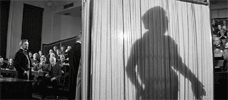
The Elephant Man
1980 -

My Bloody Valentine
1981 -

Who Can Kill a Child?
1976 -

Cannibal Holocaust
1980 -

Let Sleeping Corpses Lie
1974 -

John Carpenter’s Vampires
1998 -

Jaws 2
1978 -

A Warning to the Curious
1972 -

Wolf
1994 -

The Survivor
1981 -

Cannibal Ferox
1981 -
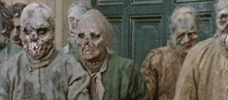
The Nights of Terror
1981 -
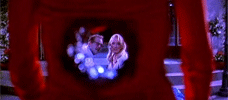
Death Becomes Her
1992 -

Alice, Sweet Alice
1976 -

Body Double
1984 -
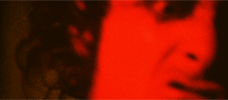
Invocation of My Demon Brother
1969 -
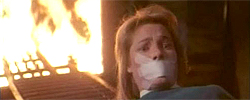
Phantasm II
1988 -

Emanuelle and the Last Cannibals
1977 -

The Wicker Man
1973 -

Maniac Cop
1988 -
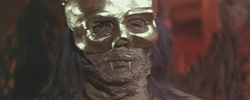
The Legend of the 7 Golden Vampires
1974 -
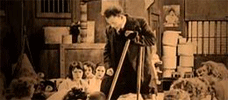
The Penalty
1920 -

Boxing Helena
1993 -

Chew on This
2005 -

Night of the Creeps
1986 -

Night of the Lepus
1972 -

Near Dark
1987 -

Army of Darkness
1992 -

The Brood
1979 -

The Lift
1983 -

Amsterdamned
1988 -

Silent Witness
1999 -

The Shaft
2001
We don’t do comments anymore, but you may contact us here or find us on Twitter or Facebook.



